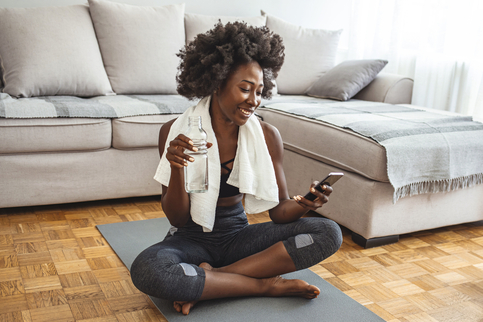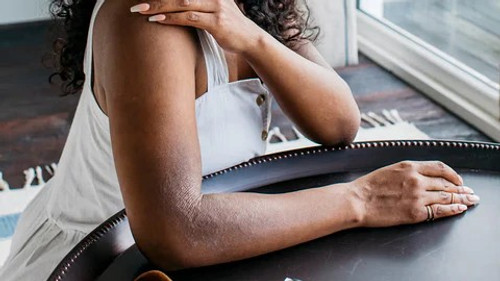Skin Irritation from Exercise?
Jul 28th 2021

We can’t be the only ones! Maybe you are like my family and I; daily walks around the neighborhood, jump rope battles and other exercise challenges in an effort to drop the pounds. We’ve been a little lax during the winter months and summer days of extreme heat just lounging around. But to tell you the truth over these past weeks, we have been putting it in overdrive because chile...these pounds have got to go! When you have eczema prone skin, working out can cause you some of the biggest flare-ups.
Say it isn’t so! I know I hate to break it to you…but sweating is the #1 problem for eczema prone skin in the summer. Why? Because sweating leads to irritation. The body sweats to regulate body temperature. But when we get hot and sweaty, the moisture evaporates, cooling us down. When this occurs, the skin dries out and we are left with a salty residue that can irritate eczema skin and bring on the itch. We notice this more in areas where moisture gets trapped, such as the inside of elbows, the back of the neck, or the back of the knees.
Because there are many reasons why exercise helps eczema: boosts energy and the immune system, lowers stress and anxiety, all which to help reduce flare-ups. Check out the following steps you can take to help minimize the effects of sweat on eczema prone skin.
- STAY COOL: It’s all about location. Whether you are at a gym or in the comfort of your own home, exercise in a location that has adequate AC. If you like to exercise outside, do so in the early mornings or in the evenings when the heat from the sun’s rays are low.
- STEER CLEAR OF SPANDEX: While it may be tempting to grab a pair of spandex pants to work out, the truth is that if you have eczema, spandex could be contributing to your eczema flare-ups. Also note that tight, form fitting workout clothes trap in sweat. Stick with light, breathable fabrics such as cotton.
- TAKE REST BREAKS: Taking a rest break or two during exercise isn’t cheating; it’s affording your body the opportunity to rest and cool down. This is important if you’re feeling the start of your eczema. Plus splitting up your workout and taking breaks gives you an opportunity to rehydrate.
- DRINK UP: Because having eczema means that we naturally have dry skin, drinking water is highly recommended before, during and after your workout. Drinking fluids regularly will replace the water lost when sweating. Waiting until you’re thirsty or your mouth is dry means you are already dehydrated.
- RINSE OFF SWEAT IMMEDIATELY: After a workout, you will want to get the sweat, chlorine, and other irritants off of your body as soon as possible. “Not removing wet and warm clothes gives bacteria the opportunity to spread and flourish on the body and result in a flare-up,” says Dendy Engelman, M.D., director of dermatologic surgery at Metropolitan Hospital in New York City. On those instances that I don’t have access to a shower (or time to take one), what has worked is wiping down with a baby or hypoallergenic wipe. This will help get rid of bacteria that can worsen flare-ups.
- MOISTURIZE BEFORE & AFTER: Applying an emollient in advance of and following a workout will help to protect your skin. So, as to not trap in heat and sweat and further irritate your skin, a light cream or an oil is recommended to use.




